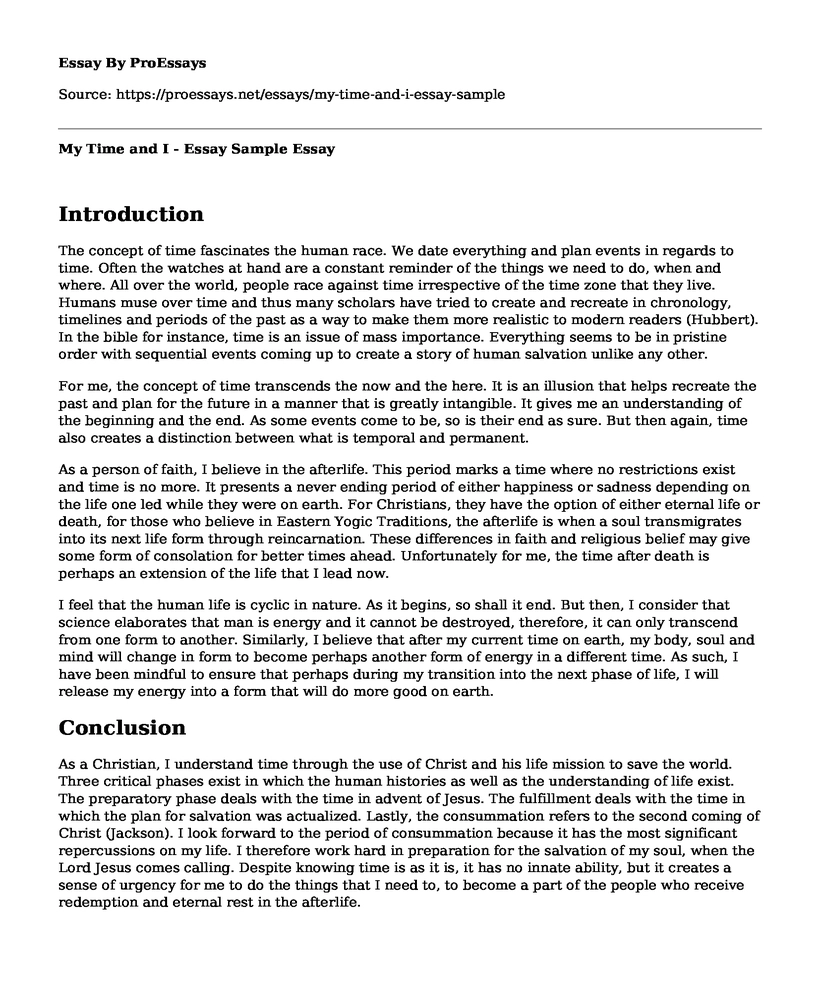Introduction
The concept of time fascinates the human race. We date everything and plan events in regards to time. Often the watches at hand are a constant reminder of the things we need to do, when and where. All over the world, people race against time irrespective of the time zone that they live. Humans muse over time and thus many scholars have tried to create and recreate in chronology, timelines and periods of the past as a way to make them more realistic to modern readers (Hubbert). In the bible for instance, time is an issue of mass importance. Everything seems to be in pristine order with sequential events coming up to create a story of human salvation unlike any other.
For me, the concept of time transcends the now and the here. It is an illusion that helps recreate the past and plan for the future in a manner that is greatly intangible. It gives me an understanding of the beginning and the end. As some events come to be, so is their end as sure. But then again, time also creates a distinction between what is temporal and permanent.
As a person of faith, I believe in the afterlife. This period marks a time where no restrictions exist and time is no more. It presents a never ending period of either happiness or sadness depending on the life one led while they were on earth. For Christians, they have the option of either eternal life or death, for those who believe in Eastern Yogic Traditions, the afterlife is when a soul transmigrates into its next life form through reincarnation. These differences in faith and religious belief may give some form of consolation for better times ahead. Unfortunately for me, the time after death is perhaps an extension of the life that I lead now.
I feel that the human life is cyclic in nature. As it begins, so shall it end. But then, I consider that science elaborates that man is energy and it cannot be destroyed, therefore, it can only transcend from one form to another. Similarly, I believe that after my current time on earth, my body, soul and mind will change in form to become perhaps another form of energy in a different time. As such, I have been mindful to ensure that perhaps during my transition into the next phase of life, I will release my energy into a form that will do more good on earth.
Conclusion
As a Christian, I understand time through the use of Christ and his life mission to save the world. Three critical phases exist in which the human histories as well as the understanding of life exist. The preparatory phase deals with the time in advent of Jesus. The fulfillment deals with the time in which the plan for salvation was actualized. Lastly, the consummation refers to the second coming of Christ (Jackson). I look forward to the period of consummation because it has the most significant repercussions on my life. I therefore work hard in preparation for the salvation of my soul, when the Lord Jesus comes calling. Despite knowing time is as it is, it has no innate ability, but it creates a sense of urgency for me to do the things that I need to, to become a part of the people who receive redemption and eternal rest in the afterlife.
Works Cited
Hubert, Henri. Essay on time: A brief study of the representation of time in religion and magic. Berghahn Books, 1999.
Jackson, Wayne. The Biblical Concept of "Time". 2018. 04 08 20118 <https://www.christiancourier.com/articles/437-biblical-concept-of-time-the>.
Cite this page
My Time and I - Essay Sample. (2022, Jul 01). Retrieved from https://proessays.net/essays/my-time-and-i-essay-sample
If you are the original author of this essay and no longer wish to have it published on the ProEssays website, please click below to request its removal:
- The Christian Message of The Lion, the Witch, and the Wardrobe
- Essay Sample on Mass Media and Propaganda Against Islam
- Essay Sample on Culture's Viewpoint on Christianity
- Essay on Modern Islam's Human Rights Commitment: Obstacles and Possibilities
- Hope: Biblical Definition & Its Relevance for Christians - Essay Sample
- Essay Example on Hebrews Letter: Reaffirming Faith in the Face of Persecution
- Essay Sample on Discovering Your Identity in Christ: Benefits and Reasons







